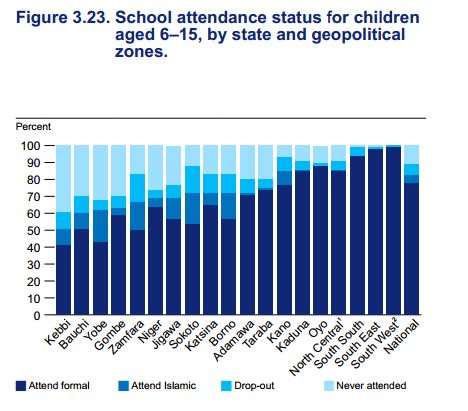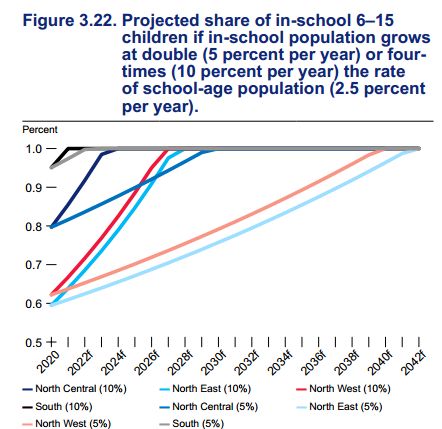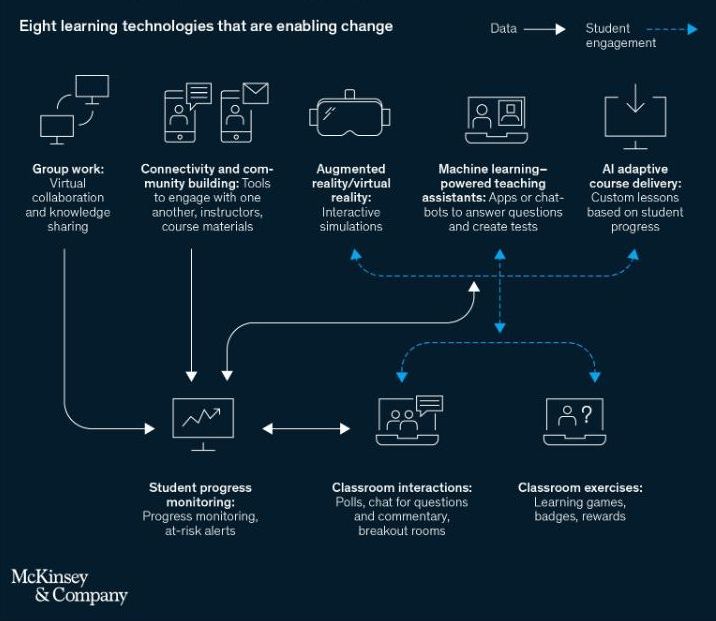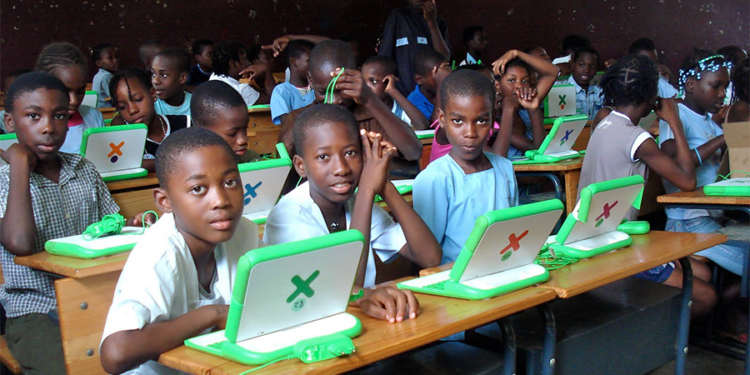Did you know:
Nigeria has the highest number of out-of-school (OOS) children in the world?
With more than 11 million children between the ages of 6 to 15 lacking proper education, the figures below show that 1 in 12 of the world’s OOS children live in Nigeria. About 90% (10 million) of all OOS children in Nigeria come from northern states – where 1 in 3 school-aged children are out of school.

Although the number of in-school children aged 6 to 15 rose from about 20 million in 2003 to 40 million in 2020, the World Bank predicts that it would take a 10% growth in the number of in-school children in Northern Nigeria to attain universal access to basic education in those states by 2030, and at 5% per year to attain it by 2040.

The Bigger Picture:
The World Bank in its report titled “The Continuing Urgency of Business Unusual” outlined some of the challenges of education in Nigeria as well as ways that these challenges can be tackled.
The challenges range from the growing rate of insecurity to the neglected educational infrastructure, poor funding and decision-making, widespread socio-economic norms such as teenage marriage and pregnancies, the 2020 global pandemic, etc.
For years, these factors have stunted the growth of education in Nigeria and not enough has been done to curtail them.
In response, the following reforms were suggested by the Bank to curb these challenges: more public campaigns to shift social norms, improved infrastructure, adequate funding and better policies, as well as more accessibility and availability of schools across the country.
Edtech as a Solution:
Educational technology (edtech) is basically the integration of technology into education in a positive manner to facilitate learning in a more diverse learning environment while providing a way for students to learn how to use technology as well.
Over the years, edtech has provided solutions to some of the many challenges of education in both developed and developing countries of the world. In Nigeria alone, the number of edtech companies are overwhelming with over 170 of these companies in Lagos alone.
In a chat with The Hub, Eno Peters, a well experienced educational technologist, CEO of ValueMax Academy and product manager at JuniorX Innovation Academy, shared some thoughts on the impact, challenges and future of edtech in Nigeria.
She said, “I think there’s a possibility for edtech adoption in Nigeria but it’s going to take some time. Although the mindset of the people here is slow to its adoption, I believe that with the right efforts made in the right places, everything is going to be transformed.”
Benefits of Edtech in Nigeria:
- Organization and Efficiency:
Earlier in July, the Kaduna SUBEB introduced a digital attendance register intended to track pupils’ attendance, ensure school retention and completion as well as enhance decision making and planning in the education sector within the state. Accompanying the initiative was the distribution of 2,358 tablets to a matching number of Head Teachers of public schools in the state. This shows how technology can be used to track children at risk of dropping out of school and help stakeholders in retaining them.
- Accessibility and convenience:
Companies like ULesson, Edukoya, JuniorX Innovation Academy and the likes have shown steadfast devotion in aiding the improvement of the quality of education in Nigeria and updating the educational curriculum to world class acceptability. They’ve made learning fun, easier and more accessible from the comfort of one’s home and they have single handedly tackled some of the looming challenges the educational system in Nigeria endures. Challenges like inadequate facilities and infrastructure, threats of insecurity, etc.
- Visual Presentations:
The adoption of virtual learning via Google Classrooms, Youtube and basically the internet has not only provided students with more convenience, but it also enables the provision or sourcing of videos and pictures, other than just the traditional texts, to facilitate the learning experience.
Eno further explains that there are different modes of learning. While virtual learning is convenient, some people may prefer physical meetings or vice versa. Hence, the adoption of edtech offers more alternatives to choose from when considering a mode of learning/teaching.

Challenges of Edtech in Nigeria:
During the chat, Eno explained that although more people are beginning to embrace technology and all of the benefits it brings, there are still many challenges that need to be addressed before edtech can stand in Nigeria.
“The lack of data in Nigeria is a major problem as building a successful online class requires a lot of reliable internet connectivity. So until the government subsidizes data or provides free WiFi in schools, we will only continue to grow at a very slow pace,” she said.
She also mentioned that the lack of extensively trained teachers is another big challenge in the development of the system. Because most teachers run on outdated knowledge, they can’t operate or train their students to flow with the current. Hence, there is a need to train and retrain teachers and students alike in the handling of digital tools so as to prepare them for the future of work which is technology.
JuniorX Innovation Academy:
Launched in 2021, JuniorX Innovation Academy is a Jos-based edtech company which teaches children within the ages of 8 to 15 courses bordered on computing, robotics, engineering and sciences.
“We started out by going to schools to educate children on 21st century skills because we realized that we’re still using a curriculum that most people consider expired. There’s so much talk regarding the expired curriculum but our core focus is to open people’s minds to see the possibilities outside the 4 walls of the classroom,” Eno said.
She explained that the reason why their focus is on this demographic of kids (aged 8-15) is because the academy’s goal is to tackle the foundation of learning, thus, the affirmation of the phrase ‘catch them young’.
“There’s something about that age range. It’s the foundation. If you are able to get a child to think creatively within that age range, they would grow up to be very capable. One of the goals of JuniorX is to input computational thinking; the ability to think critically, creatively and to produce solutions.”
Bottom Line
“The future of any society depends on its ability to foster the health and well-being of the next generation. Stated simply, today’s children will become tomorrow’s citizens, workers, and parents.
“When we fail to provide children with what they need to build a strong foundation for healthy and productive lives, we put our future prosperity and security at risk,” — UNICEF.

































